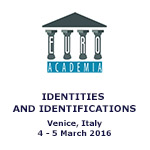Euroacademia Conferences
 Europe Inside-Out: Europe and Europeanness Exposed to Plural Observers (9th Edition) April 24 - 25, 2020
Europe Inside-Out: Europe and Europeanness Exposed to Plural Observers (9th Edition) April 24 - 25, 2020 Identities and Identifications: Politicized Uses of Collective Identities (9th Edition) June 12 - 13, 2020
Identities and Identifications: Politicized Uses of Collective Identities (9th Edition) June 12 - 13, 2020 8th Forum of Critical Studies: Asking Big Questions Again January 24 - 25, 2020
8th Forum of Critical Studies: Asking Big Questions Again January 24 - 25, 2020 Re-Inventing Eastern Europe (7th Edition) December 13 - 14, 2019
Re-Inventing Eastern Europe (7th Edition) December 13 - 14, 2019 The European Union and the Politicization of Europe (8th Edition) October 25 - 26, 2019
The European Union and the Politicization of Europe (8th Edition) October 25 - 26, 2019 Identities and Identifications: Politicized Uses of Collective Identities (8th Edition) June 28 - 29, 2019
Identities and Identifications: Politicized Uses of Collective Identities (8th Edition) June 28 - 29, 2019 The European Union and the Politicization of Europe (7th Edition) January 25 - 26, 2019
The European Union and the Politicization of Europe (7th Edition) January 25 - 26, 2019 7th Forum of Critical Studies: Asking Big Questions Again November 23 - 24, 2018
7th Forum of Critical Studies: Asking Big Questions Again November 23 - 24, 2018 Europe Inside-Out: Europe and Europeanness Exposed to Plural Observers (8th Edition) September 28 - 30, 2018
Europe Inside-Out: Europe and Europeanness Exposed to Plural Observers (8th Edition) September 28 - 30, 2018 Identities and Identifications: Politicized Uses of Collective Identities (7th Edition) June 14 - 15, 2018
Identities and Identifications: Politicized Uses of Collective Identities (7th Edition) June 14 - 15, 2018
Romanian Dacianism and the Production of a “Vernacular Modernity” in the Context of the Europeanization Process
-
-

-
Presentation speakers
- Ioana Virginia Brezeanu, Université Lumière Lyon 2, France
- Download presentation
Abstract:
Romanian Dacianism represents a neo-nationalist movement that experienced in the past years an important raise of popularity in the virtual sphere and it can be seen nowadays as an extension of elder forms of nationalism (notably the development of the “theory of continuity” in second half of the XIX century or the protochronism in the ’70s). In this article, I will discuss primarily about the political, economic and cultural changes that allowed the spread of the phenomenon, and I will try to reflect on the production of the dichotomy “east” vs. “west”, employed by the promoters of the movement in the elaboration of public speeches on the social media. Since the fall of communism, in December 1989, Romania passed from a socialist planned-economy to the free-market. The persistence of the period of transition brought to the development of an “identity crisis”. In fact, it is exactly within the effort of integration in the European Union, in the context of the Europeanization process, that a new myth of nation is created by nationalists and it has the role to define a “new national identity”, based on Dacian roots (antic population antiquity that inhabited the territory of nowadays Romania). In this context, the image of the “Occident” has been negatively embodied and then re-interpreted and transformed in a “collective enemy” or a “collective culprit”. The imaginary of “them”, the “occidentals”, is translated by the construction of some myths of conspiracy. The appropriation of a vernacular, non-Western model of modernity can be seen in this particular case as a social construction of peripherality. Based on the analysis of articles promoted and discussed on the Facebook page of the movement, I will describe further how the construction of a national imagery and the production of otherness contribute to the creation of a “vernacular modernity”. Two examples will be elaborated for this purpose: the “fear of islamization of Europe”, and the “victory of Conchita Wurst at the European Song Contest in 2014”.
-
Related Presentations













